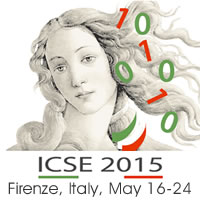About the workshop
The 2nd International Workshop on Requirements Engineering and Testing will be held in conjunction with the 37th International Conference on Software Engineering (ICSE 2015) in Florence, Italy, on Monday, May 18 2015.
Requirements Engineering and Testing are both important areas within software engineering, each with their research communities and set of practitioners. The coordination of these two fields affects the efficiency and the effectiveness of the entire software development cycle and its lead time, making this an important topic from a business perspective. While much work has been done in the respective fields of Requirements Engineering (RE) and Testing, there exists much more that can be done to increase the connection between the RE and the Testing process.
The objective of this workshop is to address the interplay of Requirements Engineering (RE) and Testing, in research and industry, including the challenges that come with connecting requirements and testing. The goal of this workshop is to highlight the importance of this cross-disciplinary research area and to develop a body of knowledge for RET. The first workshop (held in conjunction with the IEEE International Requirements Engineering Conference 2014) produced a map of the area of RET including 20 topics covered by this new research area. This map includes topics that are related to processes, practices, artefacts, methods, techniques, tools and softer aspects like the communication between roles in the software engineering processes.
The workshop aims to provide a dedicated forum for exchanging ideas and best practices and to foster industry-academia collaboration on this topic. In this way, the workshop connects the (currently) separate communities of RE and Testing.
Keynote Speaker

Mats Heimdahl
Requirements and Tests: When Do We Have Enough?
When using requirements as a basis for testing, the tester creates a set of tests to exercise a system's required behavior without regard to the internal structure of the system under test; an approach commonly referred to as black-box testing.
Generally, no objective metric is used to measure the adequacy of black-box tests—when do we have enough black box-tests to perform adequate testing? Of course, one could also ask, when do we have enough requirements to perform adequate black-box testing? In fact, maybe we should not have any requirements at all and only develop test scenarios? Currently, there are no mature techniques to help us answer any of those questions.
In this talk, we will discuss the challenges of assessing the adequacy of test suited designed to cover the required behavior of a system. We will explore how coverage measures could potentially be used to address the questions of black-box test adequacy as well as the adequacy of a set of requirements. Since the issues related to Requirements Engineering and Testing are just starting to be explored, we will also discuss many open challenges lying ahead for the RET community.
Mats' Biography.Mats Heimdahl is a Professor of Computer Science and Engineering at the University of Minnesota, the Director of the University of Minnesota Software Engineering Center (UMSEC), and the Director of Graduate Studies for the Master of Science in Software Engineering program. He earned an M.S. in Computer Science and Engineering from the Royal Institute of Technology (KTH) in Stockholm, Sweden and a Ph.D. in Information and Computer Science from the University of California at Irvine.
His research interests are in software engineering, safety critical systems, software safety, testing, requirements engineering, formal specification languages, and automated analysis of specifications.
He is the recipient of the NSF CAREER award, a McKnight Land-Grant Professorship, the McKnight Presidential Fellow award, and the awards for Outstanding Contributions to Post-Baccalaureate, Graduate, and Professional Education at the University of Minnesota.
Workshop impressions



























